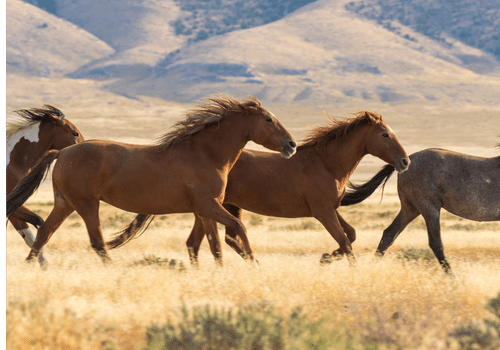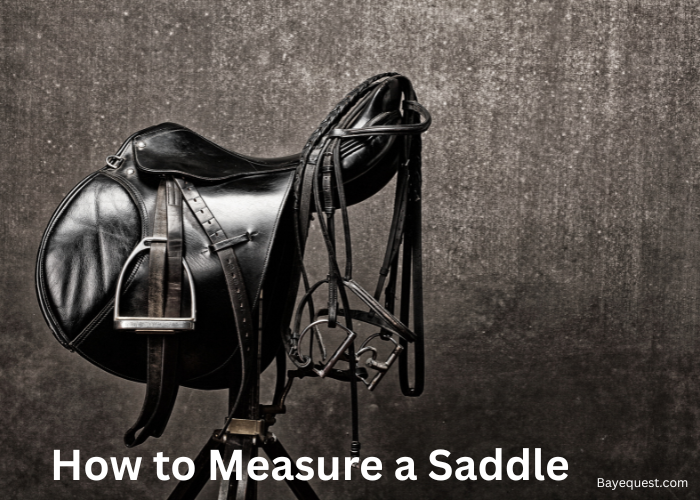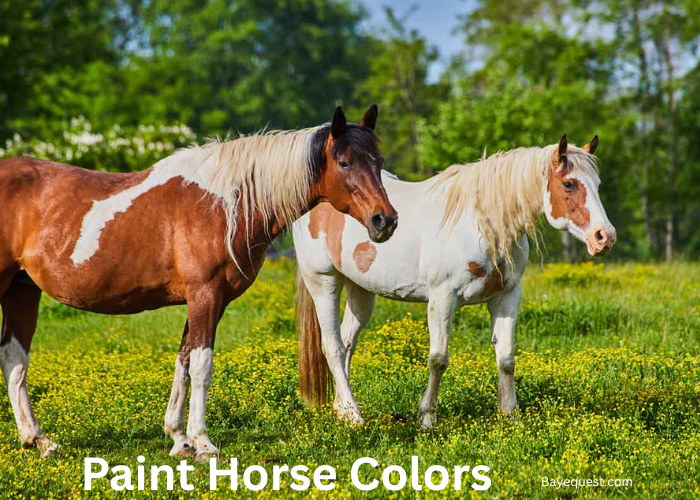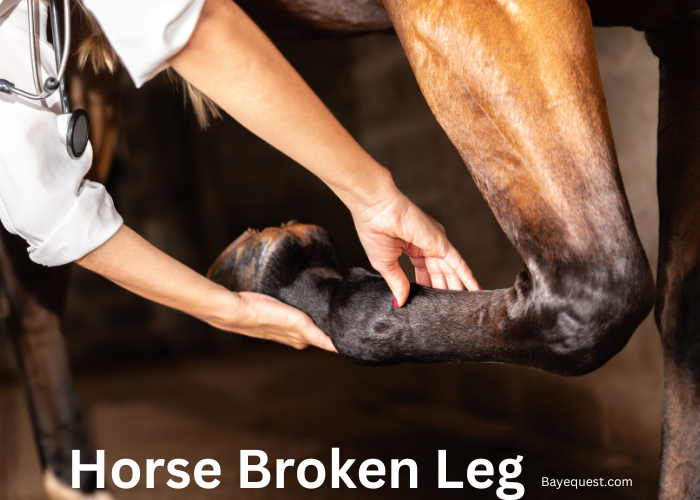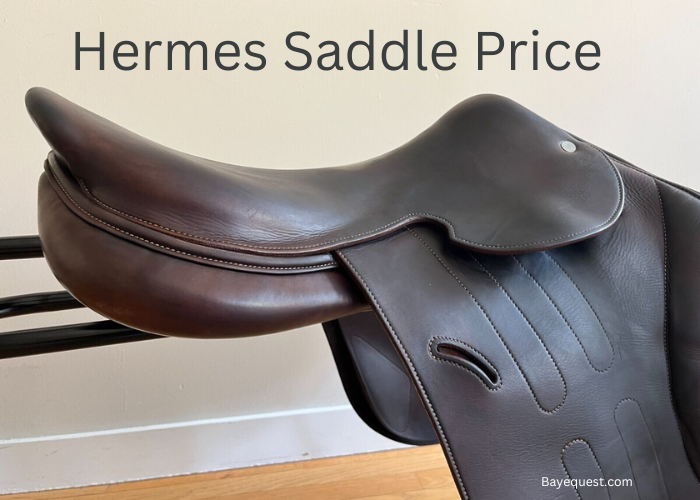In 2024, owning a Mustang horse is more than just a price tag. For horse enthusiasts, the true cost reaches far beyond the initial purchase.
This article delves deep into the real expenses of owning a Mustang horse in 2024. From acquisition to their ongoing well-being, let’s uncover the nitty-gritty of the financial commitment tied to these incredible creatures.
What Exactly is a Mustang Horse?
Mustang horses are wild or feral horses roaming the western plains of North America. In the 1500s, Spanish settlers brought over domesticated horses, but some clever ones busted free, becoming the wild Mustangs we know today.
They’re like a mixtape of horse breeds now, after mingling with domesticated ones in the US.
You won’t believe it, but since 2000, folks like you have been adopting these wild beauties.
While they used to run wild, many now find homes with people who want them. These Mustangs still exist out there, keeping that untamed spirit alive.
Is Owning a Mustang Horse Possible?
Yes, you can buy and have a Mustang horse in 2024. But most might be ‘green,’ meaning they’re not yet saddle-trained or fully schooled.
And here’s the cool part—these horses are like blank canvases. With the right training, they’ll carry riders, compete, or simply be great companions.
Are Mustangs Suitable for Novice Riders?
Well, the truth is, a fresh-out-the-wild Mustang isn’t the best pick for beginners. They’re like untamed spirits, not quite ready for new riders.
It’s like asking a rookie to dance with a pro before learning the moves!
These Mustangs straight from the wild haven’t had that human touch, so they might be a tad unpredictable. Even if a pro trains them, it’s a cautious game.
Here’s the deal, though—once they’re schooled up, they’re gems! As a newbie, you might want to start with a more settled horse. Takes a bit of experience and patience to ride these spirited Mustangs.
Where Can You Purchase a Mustang Horse?
These spirited animals, once wild, are now available through BLM adoptions, horse auctions, private sellers, and reputable trainers across the U.S.
During a BLM Wild Horse Adoption Event
You can adopt a Mustang at a BLM Wild Horse Adoption Event nationwide.
These horses come straight from the wild and may need training, but some are ready to ride for an extra fee.
Your adoption supports wild horse population management and habitat protection.
From a Private Mustang Horse Owner
You’ll often find Mustang horse ads from private owners online, like in forums or Facebook Groups.
While some may be trained and ride-ready, don’t bet on it. Luck might favour you, but it’s not the safest route because not all sellers are trustworthy.
Bayequest.com
To avoid any pitfalls when buying a Mustang horse, consider going through a trusted trainer or breeder. They provide pedigree and health records for your review, ensuring a smart purchase.
Remember, buying from a reputable breeder may cost more, but it guarantees you know precisely what you’re getting. When browsing Bayequest.com, you can find these reliable sources for a confident horse purchase.
Mustang Horse Prices in 2024: What’s the Cost of a Mustang Horse?
In 2024, Mustang horse prices can vary a lot depending on where and how you get them.
If you’re looking for a budget-friendly option, adopting a wild Mustang is surprisingly affordable. At BLM-sanctioned events, an untrained horse goes for just $25, while a gentled or trained Mustang starts at $125.
But if you buy from a private owner, the cost can go much higher, ranging from hundreds to thousands of dollars. This price difference might be due to extra training, specific skills like eventing, or detailed pedigree records. Remember that some of these Mustangs may not be genuine wild ones.
When deciding on a Mustang horse, think about your budget, desired level of training, and intended use.
Whether you pick a low-cost wild Mustang or invest in a trained one, you’re helping preserve their unique heritage and secure their future on the American landscape.
What’s the Monthly Cost of Owning a Mustang Horse?
How much it costs to keep a Mustang horse each month depends on several factors:
- Where they live, whether in a stall or outsidel.
- Their overall health, including any chronic issues.
- How often do the farrier and vet visit?
- The type of hay and feed they consume.
- If you use sawdust, which kind?
- Consider competition, equipment, and trailering expenses.
- Training needs or lessons required.
As you can see, there’s much to consider regarding monthly expenses. Let’s break down each factor to understand how it affects the total cost of owning a Mustang horse over the course of a year.
What’s the Annual Expense of Owning a Mustang Horse?
Well, it all depends on your preferences and budget. You can choose to stall or field-board them.
The annual cost of owning a Mustang horse ranges from $3,000 to $8,000. This wide range is influenced by factors like;
- Location
- The quality of supplies and equipment you purchase
- Choice of boarding facilities
- Other considerations we’ll explore below.
Housing Costs
These expenses are influenced by whether you keep your Mustang at your place or board it at a local farm.
If you choose to have your horse off-site, you’ll need to decide between two options: stall or field/paddock boarding and consider the level of care provided, either self or full-service.
Type of Boarding
Stall boarding can cost you over $800 a month, with the exact price depending on your location. On the other hand, field/paddock boarding is more budget-friendly, typically about half the cost of stall boarding.
Opting for field/paddock boarding can be a good choice if you bring home a wild horse. Why? Because it resembles their natural environment, making them feel more comfortable than in a stall.
Some barns even offer a hybrid boarding option, where your horse can spend time inside and outside during the day.
Level of Care
With self-care boarding at a local barn, you’ll be responsible for your horse’s feedings and stall cleaning.
Conversely, full-service boarding means the barn manager takes care of these responsibilities, allowing you to focus on riding and bonding with your Mustang Horse.
Prices can vary, so it’s a good idea to inquire with different barns to find the best fit for you.
Vet Bills
Your Mustang horse should usually see the vet once a year. But as they age, more frequent visits might be necessary.
Many horse owners end up scheduling vet appointments about four times a year because horses can be prone to injuries.
A vet visit typically costs between $50 and $250, excluding medications, supplements, or extra treatments.
The vet comes to your farm to check your horse in their own surroundings. But if they need to go to an equine hospital, it can get even pricier.
Farrier Fees
Even if your Mustang horse doesn’t wear horseshoes, you’ll need to book a Farrier appointment every 4-6 weeks.
Just like human nails, horses’ hooves grow and require regular trimming. This routine service will run you between $50 and $150 each time.
If you stick to the recommended schedule, the yearly farrier costs will be around $450 to $750.
Feed Expenses
Your location’s hay and grain prices and the type of feed you choose determine your yearly feed costs.
A 1,100-pound horse eats about 2% of its body weight in hay daily. When you add grain (if you use it), your annual feeding cost goes over $1,000.
Supply Costs
Supply costs for your Mustang horse encompass all the extra items they might need, including sawdust for their stall,
- Entertainment toys
- Fly spray
- Blankets for colder months,
- Brushes
- Hoof pick
You can find these items at your local equestrian supply store or online, with prices varying based on quality and size.
Show Expenses
Participating in horse shows can add up. From local to A-rated shows, each class has an entry fee.
Consider whether you already own a trailer for transportation or if you need to purchase one.
You’ll also need to factor in gas for the trailer, trainer fees, and special equipment costs, which vary widely.
Equipment Expenditure
The type of equipment you require for your Mustang horse varies.
For riding, you’ll need;
- Well-fitted saddle
- Pad,
- Bit and bridle,
- Quality helmet
- Riding boots.
Saddles range from a few hundred to several thousand dollars, while bridles fall in the $250-$500 range.
Competitive events may demand specific attire, depending on the discipline.
English disciplines may require riding gloves, a jacket, and knee-length riding boots, while rodeos typically call for a cowboy hat, cowboy boots, and jeans.
Training Fees
The annual cost of owning a Mustang horse can also hinge on whether you hire a professional trainer or riding instructor.
Breaking a feral horse can cost around $2,000 with a professional trainer. A riding instructor may visit 1-4 times monthly, charging between $25 and $150 per session, depending on instruction level.
Factors that Influence the Price of a Mustang Horse
Let’s delve into the key factors that sway the price of a Mustang horse. These elements play a significant role in determining the cost of acquiring one:
Age: The age of a Mustang horse is a crucial factor. Younger, untrained Mustangs are generally more affordable, while older, well-trained ones can command higher prices.
Training: The level of training a Mustang has undergone greatly influences its cost. Untrained or minimally trained Mustangs are typically less expensive than those with advanced skills and discipline-specific training.
Gender: Gender can impact price too. Stallions might be pricier than mares or geldings due to their breeding potential.
Bloodline: The lineage of a Mustang can significantly affect its cost. Mustangs with well-documented and prestigious bloodlines can be more expensive.
Show Record: If a Mustang has a successful show record in specific disciplines like rodeo or dressage, it can command a higher price due to its proven abilities.
Here’s a simplified table summarizing the average cost range of a Mustang horse based on these factors:
| Factor | Average Cost Range |
| Young, untrained Mustangs | $500 – $1,500 |
| Older, well-trained Mustangs | $2,000 – $5,000 |
| Stallions with strong bloodlines | $3,000 – $8,000 |
| Mares and geldings | $1,500 – $4,000 |
| Mustangs with impressive show records | $5,000 – $10,000 |
Alternatives to Buying a Mustang Horse
There are alternatives to buying a Mustang horse that can suit various preferences and situations.
Leasing: Horse leasing allows you to enjoy the company of a Mustang without a long-term commitment. You can lease a horse for a specified period, often covering their care and expenses.
Trail Riding Services: Some equestrian centres or ranches offer trail riding services where you can ride their well-trained Mustangs for a fee, allowing you to enjoy the experience without ownership responsibilities.
Volunteering: If you’re passionate about Mustangs, consider volunteering at a rescue or sanctuary. You can interact with these incredible animals and contribute to their well-being without financial obligations.
Equine Therapy Programs: Participate in equine therapy programs, which use Mustangs for therapeutic purposes. This offers a unique opportunity to connect with these horses while gaining therapeutic benefits.
The Costliest Aspects of Owning a Mustang Horse
The priciest aspects revolve around training and maintenance. Mustangs typically require training if you plan to ride them, which can be a significant expense.
Additionally, the upkeep of a Mustang horse can also put a dent in your wallet. Horses, in general, come with ongoing costs such as feeding, potential medical expenses due to injuries, and the fact that they can live up to 30 years.
So, before deciding to adopt or buy a Mustang horse, consider these expenses and be prepared for the financial commitment.
Read also: Names for Wild Horses.
The Bottom Line on Owning a Mustang Horse
Taking care of horses means regular expenses can pile up quickly.
Now, you’ve learned that even though the initial purchase price of a 2024 Mustang horse is relatively low, training and routine care costs can be quite substantial.
But remember, the unbreakable bond you form with your new horse is invaluable!
Before deciding to adopt or buy, make sure to do your research. The perfect horse is waiting for you out there, and it might just turn out to be a Mustang!




